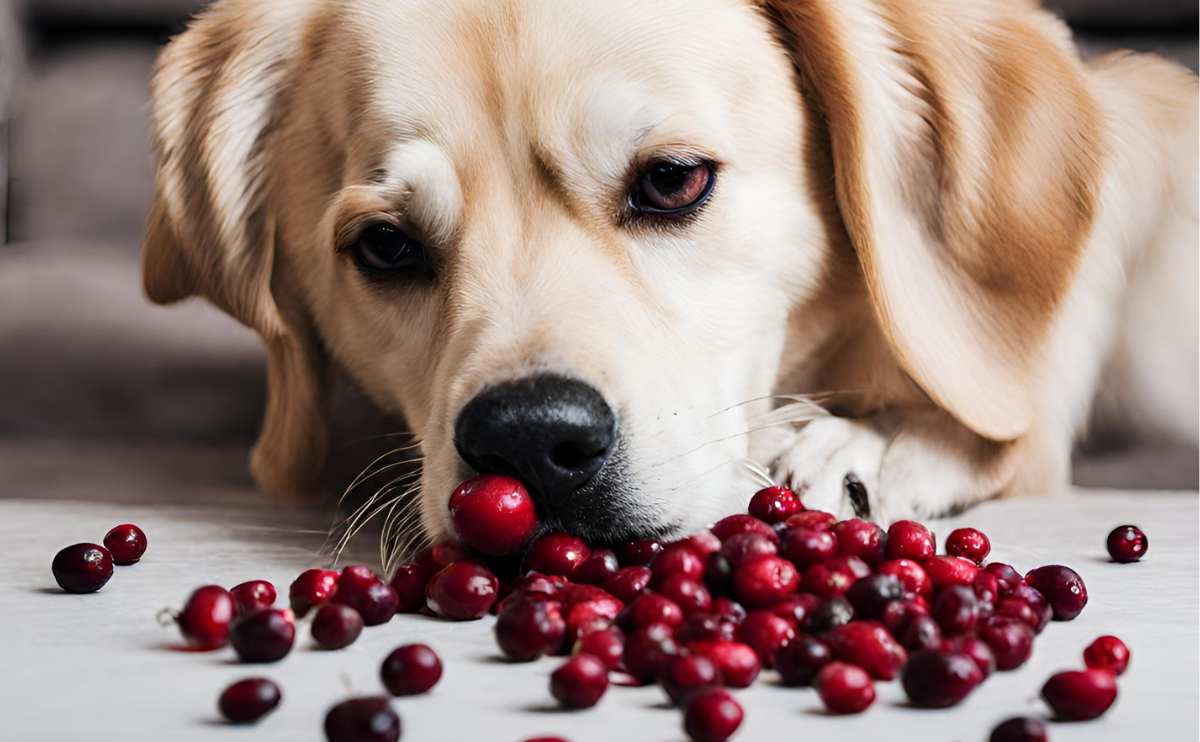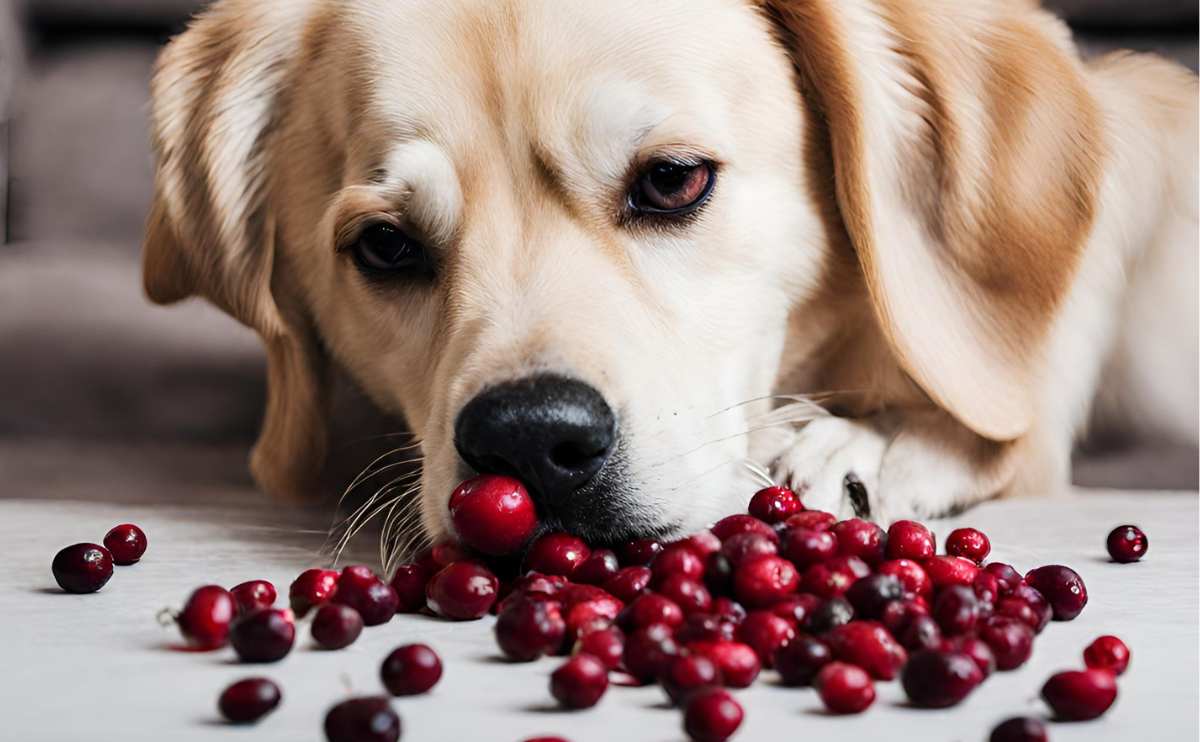

Are you wondering about feeding your dog cranberries? These tart berries are found in juices and other recipes and are a healthy snack for humans. They are also often found in commercial dog foods, leading to the question, “Can dogs eat cranberries?” Your dog can eat cranberries, but not all preparations are safe. Before adding this food to your pet’s diet, it’s essential you know all the facts, benefits, and risks that come along with it.
Can Dogs Eat Cranberries?
Contents
Yes, they can be a healthy snack for your pup or an addition to a fresh dog food recipe. However, your dog should not consume them in large quantities.
Are Cranberries Bad For Dogs?
Cranberries are not bad, toxic, or poisonous for dogs when eaten in moderation and without any added ingredients. Ideally, you should only feed your pup plain fruit.
These berries are healthy and low in fat and sugar, but eating them excessively is unsafe. Additionally, pets who suffer from long-term diseases, are on a prescription diet, or have other health considerations should only eat them if a veterinarian approves. Cranberry has a high acidic content, and overeating can cause stomach distress, diarrhea, and vomiting.
Also, remember that treats of any kind should only make up 10% of your pup’s daily calorie intake. The other 90% should come from high-quality, balanced dog food. Too much fruit can lead to diabetes and obesity.
Can Dogs Be Allergic To Cranberry?
Though it is not common, there is a chance that a pup may be allergic to cranberries. Because of this risk, you should always start by offering a very small amount and observing your pets for any signs of adverse or allergic reactions.
Are There Health Benefits Of Cranberries For Dogs?

Cranberries are a healthy choice that is low in sugar, calories, and fat. They have several health benefits, which is why they are an ingredient in many premium and high-quality dog food recipes. Along with nutrients, the fruit is high in antioxidants, which boost the immune system. They are also a source of natural fiber, aiding digestion. Along with fiber and antioxidants, here are just some of the vitamins and minerals cranberries contain:
- Vitamin A – supports bone growth, healthy vision, and immune response
- Vitamin C – a powerful antioxidant
- B vitamins – work to support a healthy nervous system and metabolism
- Vitamin E – helps support the immune and nervous system
- Vitamin K – supports muscle function and boosts the immune system
- Potassium – aids in kidney, muscle, and heart function
- Calcium – aids in healthy teeth, bones, joints, and heart
How To Feed Your Dog Cranberries
Your pup can safely eat this fruit in a few different preparations. Only the fruit itself is safe. Remove any stems left on the berries. Below, I discuss a few of the ways dogs can safely consume these tart berries.
Can Dogs Eat Dried Cranberries?
Your dog can safely eat dried cranberries as long as they do not have any added sugar or artificial sweeteners. While dried fruit is safe, stay away from trail mixes. These often include choking hazards like nuts and other dried fruits, including raisins and currents, which are not safe for your pup.
Can Dogs Have Cranberry Juice?
Cranberry juice, like other fruit juices, is only safe if it is unsweetened and made from fresh fruit. Only a small amount is safe. Most juice products available at stores use concentrate and have elevated levels of added sugar. Some also use artificial sweeteners like xylitol (also called birch sugar), which is toxic to canines. You should also avoid canned cranberry sauce, which has a high sugar content and often contains grape juice.
Cranberry For Dogs’ UTI Prevention Treatment
Cranberries, cranberry extract, and cranberry juice have long been associated in humans with urinary tract infection (UTI) treatment and prevention. There is some indication in research studies that they may have the same UTI-prevention properties in canines, but more research needs to be done on the subject.
Contrary to widespread belief, cranberry does not acidify, clean urine, or fix the urinary tract system. It is effective because it helps prevent bacteria from sticking to the bladder wall, which allows the body to flush these bacteria out of the system faster. This process helps soothe pain, helping pups recover from the UTI.
If you suspect a UTI in your pup, it is best to consult with your veterinarian and go in for an examination before adding any form of cranberry to her diet.
Also, if your dog does have a UTI, pet insurance typically covers the condition. Plus, UTIs are considered curable pre-existing conditions by most pet insurers. So, even if your dog has had UTIs in the past after the UTI is cured, future UTIs may be eligible for coverage. So it’s not too late to get pet insurance for your pup.
Looking For Other Treat Options?
All pups love treats, and of course, you want to pick healthy options. Looking for a healthy treat can be one of the reasons why you might want to turn to fruits and vegetables. However, there are plenty of other options to consider. These include vegan dog treats, frozen dog treats, homemade dog treats, organic dog treats, and more. Many pups enjoy the taste of meat, and there are plenty of freeze-dried and air-dried dog treat products to pick from.
Of course, the basis of a dog’s overall health and well-being is a healthy, well-balanced diet. Look for foods that are highly nutritious and use named meats as the first ingredients. There are plenty of fresh, human-grade, raw, and other premium options for you to consider. Always discuss any specific concerns about your pet’s health and diet with your veterinarian before trying to fix them by adding human foods.
Why Trust Canine Journal?
Danielle has had a special bond with dogs since she was a young child. She has over 30 years of pet care experience. Danielle has worked as a professional researcher for many years and spends countless hours researching the latest science and data-backed research on pet care, health, nutrition, and training developments. Danielle has tested and researched over 100 brands of dog food and counting with the help of her two dogs, Daisy and Falkor. She works alongside a professional and experienced team to bring the best, most accurate, and up-to-date information to our readers.
Tagged With: Food Safety